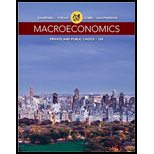
Macroeconomics: Private and Public Choice (MindTap Course List)
16th Edition
ISBN: 9781305506756
Author: James D. Gwartney, Richard L. Stroup, Russell S. Sobel, David A. Macpherson
Publisher: Cengage Learning
expand_more
expand_more
format_list_bulleted
Question
Chapter 13, Problem 17CQ
(a)
To determine
Identify the
(b)
To determine
Identify the maximum loan that the bank will extend.
(c)
To determine
Identify the changes in the bank balance sheet.
(d)
To determine
Describe whether the bank would extend an additional loan or not.
Expert Solution & Answer
Want to see the full answer?
Check out a sample textbook solution
Students have asked these similar questions
Suppose that the Bank of Canada determines that the Canadian economy is currently overproducing. What can the Central Bank do to slow down economic activity?
a. The Central bank can pursue an expansionary monetary policy by increasing the money supply, causing a decrease in the interest rate. As a result, real GDP will increase and the price level will increase.
b. The Central bank can pursue a contractionary monetary policy by decreasing the money supply, causing a decrease in the interest rate. As a result, real GDP will decrease and the price level will decrease
c. The Central bank can pursue a contractionary monetary policy by decreasing the money supply, causing an increase in the interest rate. As a result, real GDP will decrease and the price level will decrease.
d. The Central bank can pursue a contractionary monetary policy by decreasing the money supply, causing an increase in the interest rate. As a result, real GDP will decrease and the price level will increase
e. The…
Suppose Federal Reserve wants to reduce money supply.
How could Federal Reserve reduce money supply through the open market operations? Show your answers in a diagram. Your diagram should also show interbank loans.
To reduce money supply, should Fed increase or decrease Fed funds rate?
For the Fed Funds rate, who is a borrower? Who is a lender?
For the discount rate, who is a borrower? Who is the lender?
The upper limit to the federal funds rate is
A) the interest rate on reserves, because when the federal funds rate gets above a certain level , banks only want to hold reserves.
B) the discount rate, because if the federal funds rate were to go higher, banks would borrow from the Fed instead of from other banks.
C) the loan rate in the market, because banks are not willing to pay more for borrowing reserves than they get from lending.
D) there is no upper limits to the federal funds rate.
2. If the unemployment rate is falling from 4 to 3%, while the inflation rate is increasing to 5%, the Fed will most likely:
A) increase the target for the federal funds rate.
B) increase the money supply
C) not change much
D) decrease the target for the federal funds rate
E) decrease the inflation rate by setting a price ceiling.
3. When bond interest rates fall, the relative expected return on holding stocks goes___, which means that stock demand and thereby stock prices will___ ,…
Chapter 13 Solutions
Macroeconomics: Private and Public Choice (MindTap Course List)
Knowledge Booster
Similar questions
- (Monetary Control) Suppose the money supply is currently $500 billion and the Fed wishes to increase it by $100 billion. Given a required reserve ratio of 0.25, what should it do? If it decided to change the money supply by changing the required reserve ratio, what change should it make? Why may the Fed be reluctant to change the reserve requirement?arrow_forwardif the entire amount of excess reserves were loaned out, what would happen to Money supply? Now suppose the required reserve ratio was raised to 40%, and assume all excess reserves are lent out, what is the maximum amount of money the banking system could lend? Using the same situation, suppose now that an entity, bought $1 T worth of bonds from the banking system. What is your answer to “c”?arrow_forwardAssume that banks are able to lend out 85 cents on every dollar deposited, and a bank receives $9,000 in deposits. What is the reserve requirement? Find the money multiplier. How much money is ‘created’ from the $9,000 deposit? If the reserve requirement is altered to 10%, what will this do to the money supply? What does this do to equilibrium interest rate in the market for loanable funds? (Show on a graph.) What is another way the Federal Reserve will achieve the same outcome in Part D?arrow_forward
arrow_back_ios
arrow_forward_ios
Recommended textbooks for you
 Macroeconomics: Private and Public Choice (MindTa...EconomicsISBN:9781305506756Author:James D. Gwartney, Richard L. Stroup, Russell S. Sobel, David A. MacphersonPublisher:Cengage Learning
Macroeconomics: Private and Public Choice (MindTa...EconomicsISBN:9781305506756Author:James D. Gwartney, Richard L. Stroup, Russell S. Sobel, David A. MacphersonPublisher:Cengage Learning Economics: Private and Public Choice (MindTap Cou...EconomicsISBN:9781305506725Author:James D. Gwartney, Richard L. Stroup, Russell S. Sobel, David A. MacphersonPublisher:Cengage Learning
Economics: Private and Public Choice (MindTap Cou...EconomicsISBN:9781305506725Author:James D. Gwartney, Richard L. Stroup, Russell S. Sobel, David A. MacphersonPublisher:Cengage Learning


 Economics (MindTap Course List)EconomicsISBN:9781337617383Author:Roger A. ArnoldPublisher:Cengage Learning
Economics (MindTap Course List)EconomicsISBN:9781337617383Author:Roger A. ArnoldPublisher:Cengage Learning

Macroeconomics: Private and Public Choice (MindTa...
Economics
ISBN:9781305506756
Author:James D. Gwartney, Richard L. Stroup, Russell S. Sobel, David A. Macpherson
Publisher:Cengage Learning

Economics: Private and Public Choice (MindTap Cou...
Economics
ISBN:9781305506725
Author:James D. Gwartney, Richard L. Stroup, Russell S. Sobel, David A. Macpherson
Publisher:Cengage Learning




Economics (MindTap Course List)
Economics
ISBN:9781337617383
Author:Roger A. Arnold
Publisher:Cengage Learning